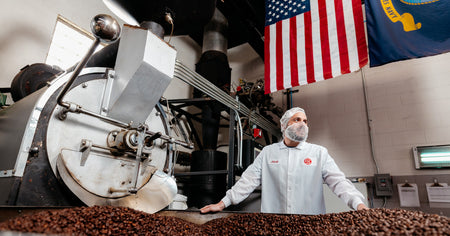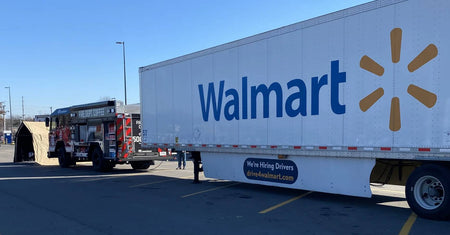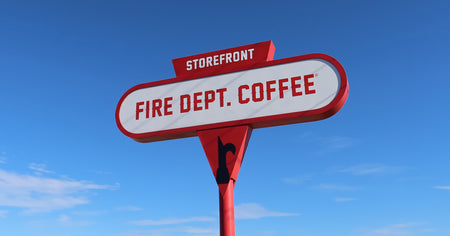November 18, 2020
You’ve finally found a roast that you like the sound of and can’t wait to taste. Now, you’re faced with another difficult choice: are you going to buy it as whole beans or ground coffee? Which one is really better? Most coffee experts will tell you that whole beans are, because they’re fresher. Full stop. No room for questions. But does that automatically make them the right ones for you (yes, you behind that screen)? Not necessarily. We think that this choice will also depend on your personal habits and brewing equipment. Let’s find out!
The differences between whole bean and ground coffee
Whole bean coffee

We can’t—and wouldn’t want to—argue with the fact that whole bean coffee is fresher. Grinding it speeds up the degassing process, which consists of the slow release of trapped gases but also of the volatile compounds responsible for your coffee’s flavor. That’s why lots of coffee lovers like to grind their beans just before brewing them! Not even the night before. This could be you if the idea of kickstarting your day with a slow coffee ritual tickles your caffeinated senses.
Whole beans are also more versatile. They would be a better choice if you like to brew with different types of coffee makers, especially those that require opposite grind sizes. For example, for the best French press coffee, you should use coarse grounds. Need a stronger espresso kick? Then you must grind them fine. Whole beans can cater to either size… and everything in between.
This will also allow you to tweak them slightly should your brew come out a bit under- or over-extracted. Basically, whole bean coffee lets you become a proper barista. You’ll just need to grab yourself a good burr grinder (duh!).
Ground coffee

By removing the grinding process from your routine, pre-ground coffee is much more practical. If you haven’t got a lot of time in the morning, it can literally save your day. That’s why some people would swear by it and wouldn’t want to live without it.
Ground coffee is also particularly handy if you usually rely on the same brewing method, perhaps one that requires medium/medium-fine grounds such as most manual pour overs and automatic drippers. Were you intrigued by the idea of experimenting with different coffee makers? Then it’s safer to stick to ground coffee, instead. However, if you only find yourself brewing French press coffee every once in a while and don’t feel that it would justify the cost of buying a grinder, you can tweak other variables: compensate your finer grounds with a shorter extraction time.
Now that you’ve learned a bit more about the central role played by the degassing process, you know that the main problem with pre-ground coffee is that it isn’t as fresh as whole grounds: can you imagine how long ago that bag of coffee sitting on the store shelf was roasted? Ugh, we don’t even want to think about it.
However, if you were really looking forward to starting your day with a quick coffee but are put off by this stale scenario, don’t worry: we have a solution! Having freshly-roasted ground coffee delivered to you on a subscription basis from a small roaster like Fire Dept Coffee means that you’re still getting the freshest coffee.
Now that you know the difference between whole bean and ground coffee and have figured out which one matches your routine the most (which is it? We’re curious now!), what are you waiting for? Let us deliver your favorite freshly-roasted beans or ground coffee to you, so that you only have to worry about brewing it.
Leave a comment
Comments will be approved before showing up.
Also in Fire Department Coffee News

Celebrating America’s Firefighting Presidents

Fire Department Coffee and Kidde Working Together to Promote Fire Safety

From Barista to Coffee Expert: Fire Dept. Coffee's Jacob Ball Brews Success

Get to Know the Hilarious, Hardworking Team Behind FDC Videos

From Fan to Family: How Lance Woodruff Became an FDC Star

Marine, Musician, Firefighter: Josh Kennedy is Doing It All

January's Coffee of the Month Club Kickstarts a Journey to 100% Direct Trade Coffee

FDC Mobilizes Rosenbauer Fire Truck for Tennessee Tornado Relief

Fire Dept. Coffee's First Retail Shop Opens in Rockford, IL

Sugar Cookie Rum Infused Coffee - Spirit Infused Coffee Club

Fire Dept. Coffee Bound for Walmart Shelves After Open Call Event

Raising Our Mugs for Firefighter Appreciation Month
FOLLOW OUR JOURNEY, GET SPECIAL OFFERS AND PROMOTIONS
- SPIRIT INFUSED COFFEE
- Bourbon Infused Coffee
- Whiskey Infused Coffee
- Rum Infused Coffee
- Tequila Infused Coffee
- Spirit Infused Coffee Club
- Spirit Infusion Process
GEAR
© 2025 Fire Department Coffee, Inc.











